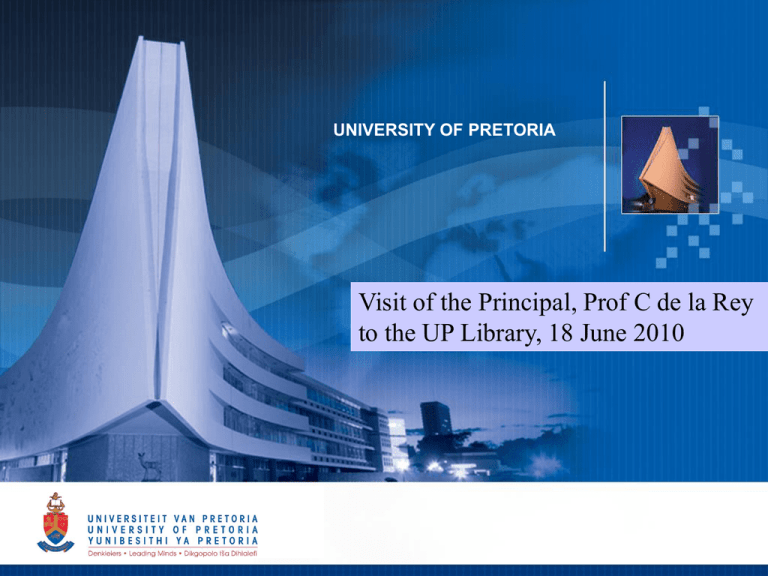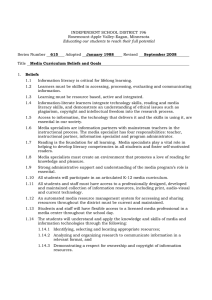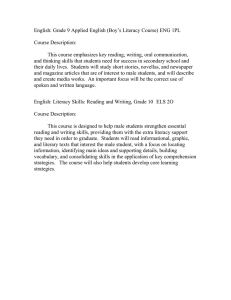Visit of the Principal, Prof C de la Rey 1
advertisement

UNIVERSITY OF PRETORIA Visit of the Principal, Prof C de la Rey to the UP Library, 18 June 2010 1 Content • • • • • Library Mandate Mission, Vision, Values Library Strategies 2006-2010 Library structure Key strategies: – Enable Teaching & Learning – Enable Research – e-Strategy – Community & Professional engagement – Quality Assurance & Staff development • Strategic planning process: 2011-2015 2 Strategic framework: Mandate The Library is responsible for the management of academic information and knowledge, and for leading the University in information and knowledge innovation 3 Vision, Mission, Values Vision We strive to be a world-class 21st century academic research library enabling the University of Pretoria to be an internationally recognised research university Mission The vision will be achieved by: • Developing a well balanced and relevant information collection • Providing access to information in all formats nationally and internationally Values • Taking responsibility for information literacy • Enabling research • Contributing to learning and teaching excellence • Developing and implementing e-services to enhance UP research, learning & teaching, and Library products • Contributing to community development We value: • Positive energy for success • Professional and ethical behaviour • Diversity as an asset Vision LIBRARY STRATEGIC AREAS Information Collection Information Literacy Enable research We strive to be a world-class 21st century academic research library thereby enabling the University of Pretoria to be an internationally recognized research university LIBRARY STRATEGIES 2007 2006 2008 2007 2009 2008 2010 2009 Redefine the information collection to meet the challenges of the new information environment Enhance information literacy for academic success lifelongeLiteracy learning & byLife-long using anLearning integrated Teachand Students Skills approach Develop Research Research Support Strengthen the role of theImplement Library in the facilitation of Support Strategylearning and teaching Strategy e-Strategy Develop new Research Support Role for Specialists to enhance: Develop, implement Information & integrate e-services UP research, learning & teaching, & Library products HR Sustainability Academic excellence People centered institution Impact positively on research Learning & teaching excellence Community development 2010 UP STRATEGIC THRUSTS Excellence in core functions Excellence in support functions Local impact Contribute to community development Open Access to Scholarly Material Obtain retain and train staff with relevant competencies & attitude Ensure the sustainability of the UPLS: Financial issues, Quality assurance, Physical facilities, Marketing, Fundraising, Risk management Transformation Interfaces Sustainability STRATEGIC HORIZONTAL DESIGN Department of Library Services, University of Pretoria DIRECTION, PHILOSOPHY, PRIORITIES (Robert Moropa) Fac Lib : LAW Fac Lib : EDU Fac Lib : EMS Fac Lib : HUM Fac Lib : THE CLIENT SEGMENTS Researchers Alumni Fac Lib : ENG Post graduate students Lecturing staff Undergraduate students External market Fac Lib : Science Special Collections Central Circulation Learning Centre (Heila Pienaar) (Ujala Satgoor) (Robert Moropa) SUPPORT SERVICES UNITS: FINANCE, HUMAN RESOURCES & FACILITIES Fac Lib : HEA Library Technical Services “Back Office” Virtual research environment E-Service Research space Learning centre / space Physical service Fac Lib : VET IT (Maintenance & Development of Infrastructure) CLIENT FACING DELIVERY UNITS & OPERATIONS (Hilda Kriel) MARKETING, TRAINING & FUNDRAISING QUALITY ASSURANCE DELIVERY CHANNELS eRESERCH & DEVELOPMENT & SERVICES SCHOLARLY COMMUNICATION POLICIES & STANDARDS Key strategies Enable teaching & learning Enable research •Information literacy training (e.g. using game technology) •Faculty libraries with information specialists for each subject •Learning centre / commons •Relevant information collection (extensive e-resources) •Integration with ClickUP (web pages with full-text information resources) •Relevant reserved information collection Community & professional engagement •Information literacy training for postgraduates and researchers •Enhanced research competencies •Planned research commons Mandate: Library is responsible for the management of academic information and knowledge, and for leading the University in information and knowledge innovation •Carnegie African Library Leadership Academy e-Strategy •Mamelodi library community outreach •Open access repositories •Presenting workshops on eskills •Digitisation & preservation •World Digital Library •Open mandate (UP articles) •Web 2 tools •e-Research: research data management & VRE’s (virtual research environments) Enable Teaching & Learning 8 Examples of services & projects that enable teaching & learning • • • • • • • • – – – – Anti-plagiarism campaign Reference pages in ClickUP Copyright Clearance Centre Library 2 tools: Library mashup page, Movies @ Merensky and Fiction Friday via blidgets Services to visually impaired students Information specialist in Spur Virtual Reference service and chat service (Ask-a-Librarian) Training: Orientation of First Years Training as part of academic courses Training that is done on request but does not form part of the formal curriculum Individual vs group training 9 Next 10 Back Comparison between 2006 survey and 2010 survey: In 2006 information specialists provided training to 9644 clients and in 2010 they provided training to 15595 clients. In 2010 there is a 62% (5951) increase in the amount of clients that received training, compared to 2006. Amount of clients trained 20000 19000 18000 17000 16000 15595 15000 14000 13000 12000 11000 10000 9000 9644 8000 7000 6000 5000 4000 3000 2000 1000 0 2006 2010 11 Back Comparison between 2006 survey and 2010 survey: In 2006 the amount of information literacy training courses provided by information specialists formed part of 87 specific academic courses (Eg. Economics 110) and in 2010 information literacy training formed part of 95 specific academic courses. In 2010 there is only a 9% (8) increase in the amount information literacy training courses that forms part of a specific academic course, compared to 2006. However, in 2010, 125 extra information literacy training courses (That does not form part of a specific academic course) were also presented to various clients. Amount of information literacy training courses 100 95 90 87 80 70 60 50 40 30 20 10 0 2006 2010 12 Back Back Enable Research • Skilled information specialists: Workshop attended by all information specialists on the Research process • Carnegie Grant – Research Commons – PRIMO (Discovery tool) – Research Academies • Information specialists have office hours in some Faculties 14 e-Strategy: Why such a strategy? • Can be seen as a high-level Innovation Strategy for any organisation • Integrate e-Information applications within a broad framework • Help to focus the organisation • Keep the organisation on the cutting edge of new developments • Establish a framework for capacity e.g. staff, IT to implement the strategy • Actually just another term for a focused corporate Knowledge Management strategy 15 Objective: Creating an e-Environment for Scholarship e-Research e-Learning Library web Repositories e-Resources e-Information Strategy focus areas Mobile services Open Scholarship Web / Library 2 Digitisation & Preservation e-Research Objective: to do faster, better and different interdisciplinary research • e-Research advocacy • Virtual Research Environment (VRE) projects • Research data management initiatives e-Research Advocacy •Digital Curation Conference: 2008 (Pretoria) •e-Research Seminar: 2009 (Pretoria) •Digital Scholarship & Curation Conference: 2009 (Pretoria) •Digital Scholarship & Curation Conference: 2010 (Gaborone) Van Deventer, M., Pienaar, H. 2009. Report on the 2nd African Digital Scholarship and Curation Conference. D-Lib Magazine, 15 (7/8), July / August 2009. http://www.dlib.org/dlib/july09/vandeventer/07vandeventer.html Pienaar, H., Van Deventer, M. 2009. To VRE or not to VRE? Do South African malaria researchers need a virtual research environment? Ariadne, 59, April 2009. http://www.ariadne.ac.uk/issue59/pienaar-vandeventer/ Repositories: research results; experiments; literature & documents SA Malaria researchers’ VRE components Identification of research area Literature review & indexing Dissemination & artifacts Skype, smart board, video conferences E-learning system for researchers (Collaborative) Electronic Lab book Integrated data management system Red: none Orange: some Yellow: all Web/wiki/blog: search engines, databases; researchers & topics; funders, portals, communication, projects Real time communication Identification of collaborators Proposal writing Training / mentoring etc Scientific workflow Servers with data files Internal shared database of indexed articles Sophisticated instruments that generate digital information and data Mathematical modelling tools; numerical algorithm tools; simulation software; in silico experiments Identification of funding sources Document management system Generic software e.g. MS / Open Office Project management Access to research networks & super computers; access to labs with in silico screening + Project management system (Free) Data analysis software BL / MS RIC: Management of published info ResearchGate: research collaboration OPENWETWARE: Lab Notebook on Blog myexperiment: scientific workflows HUBzero: access to interactive simulation tools archer e-Research toolkit: data management nanoHUB: subject gateway built on HUBzero platform Research data management • Survey of research data management practices at the University of Pretoria • Very Large Database initiative (CSIR) • World Data Centre for Biodiversity and Human Health in Africa (NeDICC) e-Learning Integration of web resource pages with the different modules of the e-Learning system Teaching e-Skills to UP librarians: 60 minutes workshops Games for Information Literacy Digitisation > Digital Collections http://www.library.up.ac.za/digital/index.htm World Digital Library (WDL) e-Resources, global search engine & catalogue Open Scholarship Repositories Digital Repository Model Only digital material can be submitted: digitised or digitally born Van Deventer, M.J., Pienaar, H. 2008. South African repositories: bridging knowledge divides. Ariadne, 55, April 2008. http://www.ariadne.ac.uk/issue55/vandeventerpienaar/; https://www.up.ac.za/dspace/handle/2263/8615 UP Library manages 2 repositories Examples: Repository content Web 2 tools Facebook: Information specialists available in the student environment Blogger: UPSpace metadata training Penzhorn, C., Pienaar, H. 2009.The use of social networking tools for innovative service delivery at the University of Pretoria Library. Innovation: journal of appropriate librarianship and information work in Southern Africa. 38, June 2009: 66-77. http://www.innovation.ukzn.ac.za/innovationbase.htm YouTube channel for UP Library http://www.youtube.com/watch?v=Sy0f-qHSHM4 Library web: gateway to tools, information resources & experts UP Library Mobile Web page (beta) Community & Professional engagement • • Community engagement mostly from Mamelodi campus Information literacy project in co-operation with Mae Jameson Reading Room, US Embassy 38 Partnerships & professional organisations • Partnership with TCLIS – BookJol (2008) – World Book Day (2009) • Centre for African Library Leadership (CCNY funding - $1m) – Training Facility in the Merensky Library – Carnegie Library Leadership Academies (6) – Train-the-Trainer (3) – Address the library leadership needs in SA & Africa • • • • • • • LIASA – national and regional leadership Board of the National Library of South Africa GAELIC (chair) SANLIC (board) CHELSA SAOUG NeDICC 39 Quality Assurance & Staff Development • Quality Assurance – Self review - 2006 – HEQC Audit 2007 - commendation for the Library – Benchmark exercise with national and international university libraries – Peer Review - 2010/2011 • Staff Development – Investors in People assessment - 2009 – Staff Development Plan – Towards a people organisation – One organisation, many leaders Table 3: Indicators for South African university libraries (including distance students)# University UP* A B** C D*** Library allocation as % of university income 4.6% 6.4% 6% 5.4% 6.01% Average expenditure per student (2007) R1519 R2948 R2069 R2059 R2076 Average expenditure per client (2007) R1428 R2660 R1923 R1929 R1988 Students per library staff member 303 132 174 208 138 Clients per library staff member 322 146 188 222 145 UG students per computer workstation 149 90 67 151 75 UG students per study seat 16 8 5 10 15 Service hours**** 70 74 45 72 82.5 Sites 11 9 11 5 4 Service points/manned desks 17 22 16 21 5 * UP study centre included in study seats count ** University B: Library allocation as % of university income: information from the library’s web site *** University D: 2006 data **** Hours per week during term time #DEPARTMENT OF LIBRARY SERVICES 2008 BENCHMARKING REPORT Strategic Planning Process: 2011-2015 • • • • • • Framing Scanning Forecasting Visioning Planning Acting (Hines & Bishop, Thinking about the Future, 2007) 42 "The UP Library Services has earned a reputation for strategic bravery, innovation and independent thinking." 43



